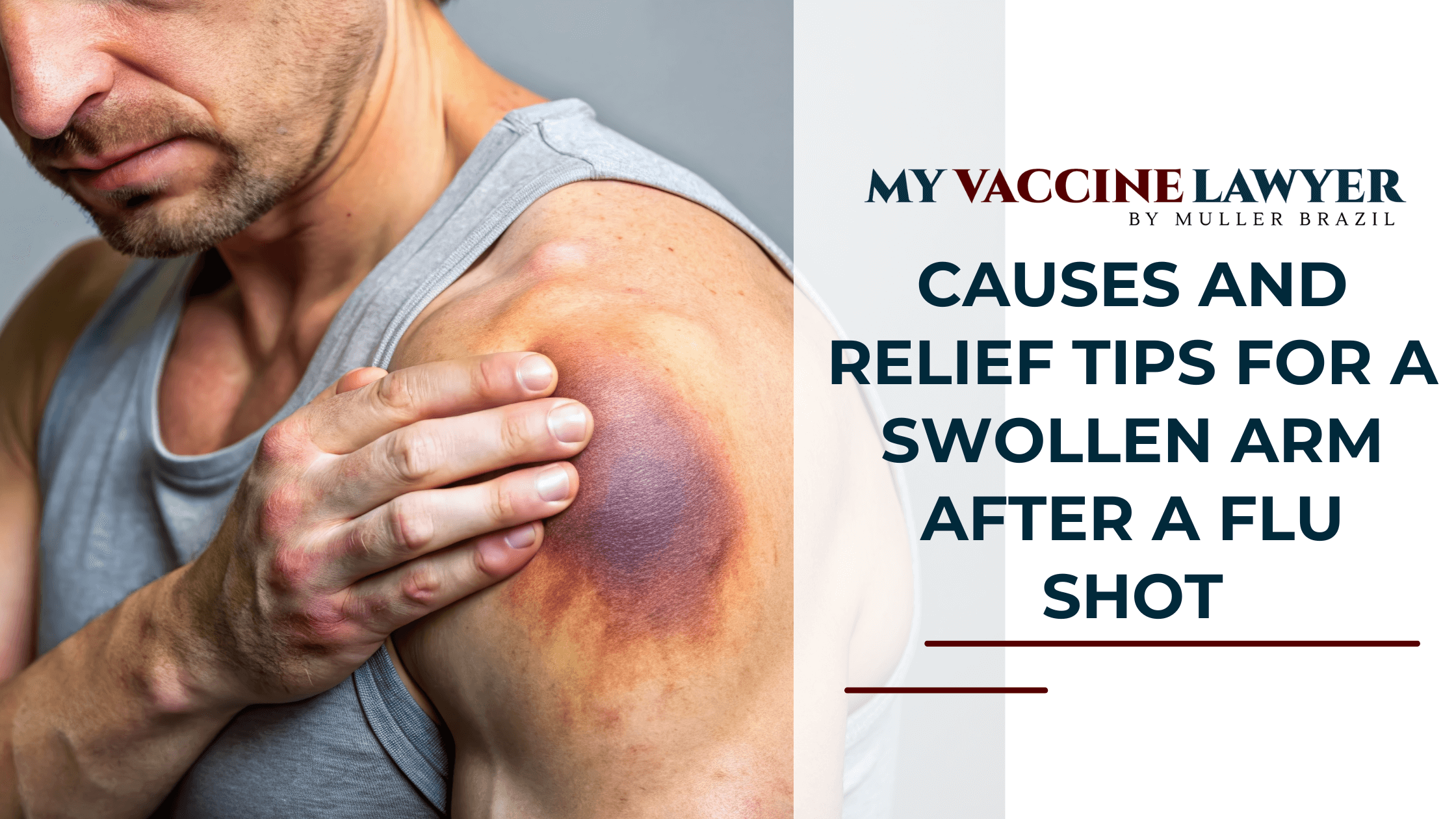Does a Flu Shot Make Your Arm Sore?
A flu shot can make your arm sore due to muscle irritation and your immune response, but persistent pain could signal a more serious issue requiring...
4 min read
Vaccine Injury Law Resources / Arm Pain / Causes and Relief Tips for a Swollen Arm After a Flu Shot
 Max Muller
:
Feb 20, 2025 10:03:00 AM
Max Muller
:
Feb 20, 2025 10:03:00 AM
Flu shots can cause arm swelling due to your body's immune response, but if the swelling worsens or persists, it may signal a more serious issue requiring medical attention.
A swollen arm is one of the most common side effects of a flu shot, but why does it happen? After a flu vaccination, some individuals experience redness, swelling, or soreness at the injection site. These symptoms are typically mild and temporary, but in some cases, prolonged pain or severe swelling may indicate a more serious reaction.
The flu vaccine works by stimulating the immune system to build protection against the influenza virus. This immune response can lead to arm soreness, swelling, and mild discomfort, as the body reacts to the vaccine ingredients. While these side effects are normal, knowing how to reduce soreness and when to seek medical attention is important.
After receiving a flu vaccination, it’s normal to experience soreness, redness, or mild swelling at the injection site. These common side effects occur as the immune system responds to the influenza vaccine and typically resolve within a few days.
Other potential side effects of a flu shot may include:
These reactions are typically mild and indicate that the body is building protection against the flu virus. The flu shot cannot give you the flu, but it may cause short-term discomfort as part of the immune response.
A sore arm after a flu shot is a direct result of the immune response triggered by the influenza vaccine. When the flu vaccine is injected into the arm muscle, the body recognizes the vaccine components as foreign and begins producing antibodies. This immune system reaction can lead to temporary swelling, soreness, and discomfort at the injection site.
Additional factors that may contribute to arm pain include:
What Causes Injection Site Reactions After a Flu Shot?
After a flu vaccination, some people notice swelling, redness, or tenderness at the injection site. This reaction occurs because the flu vaccine is injected directly into the arm muscle, triggering a localized immune response.
Common reasons for injection site reactions include:
These reactions are a normal part of the body’s response and usually subside within a few days. However, if swelling increases or lasts longer than expected, it may require further medical attention.
While flu shot soreness is temporary, there are simple ways to reduce arm pain and swelling after vaccination:
Take Control of Your Injury Today
How Can You Prevent Arm Soreness Before a Flu Shot?
While arm soreness after a flu shot is common, there are steps you can take to reduce pain before vaccination:
While most common side effects of a flu shot - such as arm soreness, mild swelling, and fatigue are typically mild, some reactions may indicate a more serious issue.
Seek medical attention immediately if you experience:
What Should You Do If You Suffer a Vaccine-Related Injury?
For most people, a sore arm or mild swelling after a flu shot is temporary. But if your flu vaccine reaction results in prolonged pain, limited mobility, or severe complications, it may be more than just a routine side effect.
At My Vaccine Lawyer, we represent individuals who experience serious flu shot injuries, such as SIRVA (Shoulder Injury Related to Vaccine Administration), Guillain-Barré syndrome, and severe allergic reactions. Through the National Vaccine Injury Compensation Program (VICP), you may be eligible for financial compensation to cover medical expenses, lost wages, and pain and suffering at no cost to you.
Yes, experiencing arm hurt after a flu shot is one of the most common side effects. This discomfort is caused by the immune response to the influenza vaccination, which helps the body build protection against the flu virus.
Mild swelling and soreness at the injection site typically last between one to three days. If symptoms persist beyond this timeframe or worsen, it may be a sign of a more serious reaction that requires medical evaluation.
To reduce arm soreness, keep your arm moving, apply an ice pack, and take an over-the-counter pain reliever like ibuprofen or acetaminophen (if approved by your doctor).
While most people tolerate the flu shot well, in rare cases, it can cause serious side effects, including severe allergic reactions or chronic shoulder pain due to improper vaccine administration. If you suspect a vaccine-related injury, legal options may be available.
The Centers for Disease Control and Prevention (CDC) advises annual flu vaccination to protect against new and evolving strains of the influenza virus. The flu vaccine is updated each year to provide the most effective protection based on current disease trends.
Mr. Muller currently devotes the majority of his law practice to aggressively fighting for the victims of unsafe drug and medical device injuries, as well as vaccine injuries and vaccine reactions involving the flu shot, TDaP/DTaP vaccine, and more. He has handled hundreds of SIRVA injury cases (shoulder injury related to vaccine administration), especially those involving bursitis, tendonitis, frozen shoulder, and rotator cuff tears. Mr. Muller also handles cases where vaccines caused serious nerve injuries such as Guillain-Barre Syndrome. Mr. Muller has recovered millions of dollars in compensation for his clients in the Vaccine Injury Compensation Program.

A flu shot can make your arm sore due to muscle irritation and your immune response, but persistent pain could signal a more serious issue requiring...

To relieve flu shot side effects, start by applying a cold compress to the injection site right after getting the shot to reduce pain and swelling....

The flu shot is one of the best ways to protect yourself from the flu virus, but what happens after you get vaccinated matters, too. While most...
